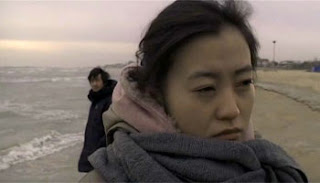★★★
I thoroughly enjoyed this film despite its flaws. My experience in watching it was like that of reading a long, difficult but good book: there’s a reward at the end and I’m glad to have read it, though I’m not sure I’d read it again.
I liked many aspects of the film. Summer Palace mostly follows the life of Yu Hong, a student from the country who goes to Beijing for university study. Her emotional complexity is the center of most of the action of the movie and, unfortunately, one of the aspects of the film that I found tedious as she whips repeatedly from love to anger to frustration to dissatisfaction and back.
But as she becomes more intense and expressive emotionally, so does the political expression of students in the Chinese capital intensify, and the parts of the film that create this parallel are amazing achievements. You see the parallel when several scenes of her tempestuous emotional life are followed by scenes of the liberty and excitement of the students’ burgeoning activism. Ye Lou eventually intercuts between these areas of the story more and more frequently, orchestrating all of this tumult to the penultimate conflict in Tiananmen Square. And as if that weren’t impressive enough, the Tiananmen conflict itself is a study of effective editing and staging that even Eisenstein would appreciate. This is one of the great parts of the movie.
The conflict over, Ye Lou segues into yet another powerful set of edited sequences showing the collapse of the Berlin Wall and the surging of freedom in Europe, contrasting that with the Chinese assertion of authority in Hong Kong. And these scenes parallel the emotion range of the characters in the movie, too: freedom and expressiveness in Berlin with curbed passion in China. It is these combined elements that I like so much in Summer Palace – the parallels between political freedom and emotional life that are not causal in the least but still echo each other. The fluidity of the editing throughout this film is marvelous, and the parallel freedoms are engaging.
My major qualm here is the character of Yu Hong and the way Ye Lou presents her. We don’t see any side of her except her moodiness, anger and pouting, so we don’t know where that comes from or how these characteristics affect her outside her relationship with her boyfriends. As we see her, in fact, she’s not very likeable. And Ye Lou bears a lot of that responsibility since he did the screenplay as well as directed the movie. Worse still, in his direction, we spend long periods as Yu Hong argues, has sex, and pouts, a repetition that slows the film while adding little content. Perhaps this repetitive emotional tumult has something to do with Chinese culture or film context (melodrama?), but it was the weakest side of the film for me, and I wish we’d lost about a half hour of it.
